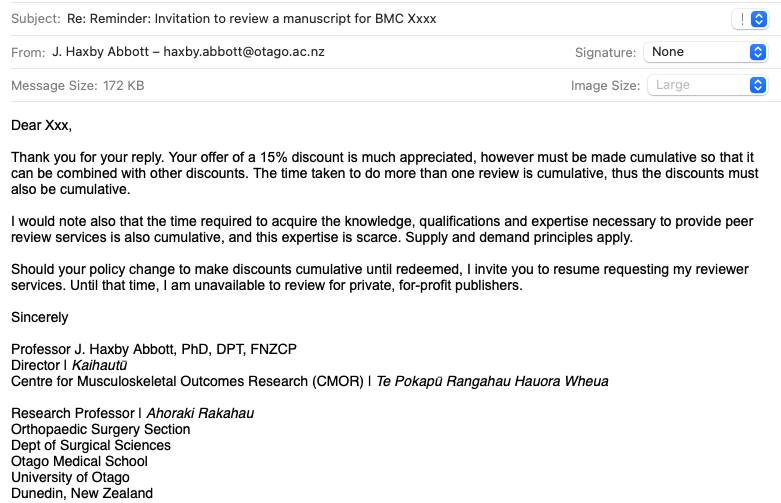This is how it rolls in 2021.
Join me in the revolution #peerreview #journals #science #AcademicJournals
Join me in the revolution #peerreview #journals #science #AcademicJournals

...and my reply
(again, feel free to copy and use when responding to any requests to review by private, for-profit publishing corporations) #peerreview #sciencetwitter #AcademicJournals #AcademicTwitter
(again, feel free to copy and use when responding to any requests to review by private, for-profit publishing corporations) #peerreview #sciencetwitter #AcademicJournals #AcademicTwitter

Getting some great questions on this:
1. Are to taking this line on all journals or just the ones that require an APC to publish? What about the #paywall ponies?
>I know there are other issues with publishers that charge readers/subscribers a bomb, but one campaign at a time...
1. Are to taking this line on all journals or just the ones that require an APC to publish? What about the #paywall ponies?
>I know there are other issues with publishers that charge readers/subscribers a bomb, but one campaign at a time...
Q2. But I'm submitting papers that need to be peer reviewed, are you suggesting I not doing my bit for the system...
>By all means, review - but prioritise who you do it for (next Tweet)
>By all means, review - but prioritise who you do it for (next Tweet)
Prioritise: a) the official journals of groups you're a member of; b) ones don’t make an obscene profit out of publicly-funded, public-good research, without giving back.
because, whose system are you "doing your bit" for? the public good science system, or the private corporations that need us to both produce their content AND provide the time-costly, publicly-subsidised, scarce skill that they need for their highly profitable business model?
I figure they can't have it both ways: There's no question that quality publishing costs money; there is significant ‘value’ in the reach and credibilty that established publishers offer - but there is significant value in the services that peer reviewers provide
I'm willing to pay them for their service - I'm only asking that they pay me for mine.
the Boards of Directors of academic & professional societies you're a member of have the responsibility to get the best publishing deal on behalf of their stakeholders. So don't undermine their efforts - review for the journals you pay dues for (and elect good BoD members)
the supply-and-demand curve has changed. There is greater demand for reviewers, but supply is limited. So if the big guns want our services (which they need for their business model to generate profits) it’s time they recognise the true value we provide. Viva la révolution!
OK, potential unintended consequences time: 1) the most profitable publishers can afford to offer reviewers some credit, so do, and thus become more dominant. Discuss
“The time has come for peer reviewers to rebel... insist on a proper payment or some other real reward”
Richard Smith, former Editor-in-Chief, BMJ
#PayForPeerReview #peerreview #AcademicTwitter
blogs.bmj.com/bmj/2021/02/01…
Richard Smith, former Editor-in-Chief, BMJ
#PayForPeerReview #peerreview #AcademicTwitter
blogs.bmj.com/bmj/2021/02/01…
@threadreaderapp unroll please
• • •
Missing some Tweet in this thread? You can try to
force a refresh








